|
Loading
|
|
|
Ibsen and Hedda Gabler
Henrik Ibsen
Ibsen published his first play, Catilina a tragedy in verse in 1850. As stage manager and playwright with the National Stage in Bergen, and 'later artistic director of the Norwegian Theatre in Oslo, he had a chance to develop his gifts as a writer. His early work celebrated the past glories of his country. Love's Comedy, a satirical verse play on contemporary life, was the first work to show another side to Ibsen's character. Produced while he was at the Norwegian Theatre, it was followed by The Pretender in 1863; the same year that a travelling fellowship removed most of his financial worries: Two years later the masterpiece Brand was produced and shortly after, he left Norway, spending the better part of his life in Italy and Germany; where he wrote the bulk of his plays. Brand — the tragedy of a supreme idealist — established Ibsen as a major European playwright. Peer Gynt (1867) was his last verse play, and with its completion, he moved from the realm of folklore, historical themes and romantic pageantry into the field of social realism, for which he is perhaps most widely known: The League of Youth and the Pillars of Society began this new phase of his work, and were followed by A Doll's House, Ghosts, Rosmersholm, The Wild Duck, An Enemy of the People, The Lady from the Sea and Hedda Gabler. In these dramas, Ibsen rebelled against the perpetuation of empty traditions, so treasured by conventional society, and explored the nature of the woman of the 19th century, whose emerging self-awareness was so often in conflict with the role assigned her by that same society. His last plays effect a blending of realism and folk poetry, using symbolism as their idiom. The Master Builder, Little Eyolf, John Gabriel Borkman and When We Dead Awaken belong to this group. In 1891, Ibsen returned to Norway, settling in Christiania (Oslo); where he remained until his death in 1906.
Notes on play crafting
"Before I write down one word, I have to have the character in mind through and through. I must penetrate into the last wrinkle of his soul. I always proceed from the individual; the stage setting, the dramatic ensemble, all of that comes naturally and does not cause me any worry, as soon as I am certain of the individual in every aspect of his humanity. But I have to have his exterior in mind also, down to the last button, how he stands and walks, how he conducts himself, what his voice sounds like. Then I do not let him go until his fate is fulfilled. As a rule, I make three drafts of my dramas which differ very much from each other in characterization, not in action. When I proceed to the first sketch of the material I feel as though I had the degree of acquaintance with my characters that one acquires on a railway journey; one has met and chatted about this or that. With the next draft I see everything more clearly, I know characters just about as one would know them after a few weeks' stay in a spa; I have learned the fundamental traits in their characters as well as their little peculiarities; yet it is not impossible that I might make an error in some essential matter. In the last draft, finally, I stand at the limit of knowledge; I know my people from close and long association - they are my intimate friends, who will not disappoint me in any way; in the manner in which I see them now, I shall always see them."
- Henrik Ibsen
Hedda Gabler
Dear Count Prozor:
I shall not let a moment go by before replying briefly to the letter I have just had the pleasure of receiving from you.
The title of the play is Hedda Gabler. My intention in giving it this name was to indicate that Hedda as a personality is to be regarded rather as her father's daughter than as her husband's wife.
It was not really my intention to deal in this play with so-called problems. What I principally wanted to do was to depict human beings, human emotions, and human destinies, upon a groundwork of certain of the social conditions and principles of the present day. When you have read the whole, my fundamental idea will be clearer to you than I can make it by entering into further explanations."
Henrik Ibsen excerpt from letter to Moritz Prozor — December 4, 1890
“Before I write down one word, I have to have the character in mind through and through. I must penetrate into the last wrinkle of his soul. I always proceed from the individual; the stage setting, the dramatic ensemble, all of that comes naturally and does not cause me any worry, as soon as I am certain of the individual in every aspect of his humanity. But I have to have his exterior in mind also, down to the last button, how he stands and walks, how he conducts himself, what his voice sounds like. Then I do not let him go until his fate is fulfilled.
As a rule, I make three drafts of my dramas which differ very much from each other in characterization, not in action. When I proceed to the first sketch of the material I feel as though I had the degree of acquaintance with my characters that one acquires on a railway journey; one has met and chatted about this or that. With the next draft I see everything more clearly, I know characters just about as one would know them after a few weeks’ stay in a spa; I have learned the fundamental traits in their characters as well as their little peculiarities; yet it is not impossible that I might make an error in some essential matter. In the last draft, finally, I stand at the limit of knowledge; I know my people from close and long association — they are my intimate friends, who will not disappoint me in any way; in the manner in which I see them now, I shall always see them.”
Henrik Ibsen
“Hedda Gabler is the psychological study of a woman. A fascinating, tragic,
hateful woman; a woman of the world — well-bred, of subtle intellect,
cultivated, exquisite. ... T he
two principal motivating factors in the pattern of Hedda’s behavior are her
environment — the stuffy middle-class atmosphere in which she finds herself
trapped — and her pregnant condition — which her fastidious, twisted nature
finds unbearably offensive. In different circumstance, surrounded by beauty and
wealth . .. Hedda might have been quite a different person. It is her spiritual
poverty that generates the boredom that causes her to destroy others and
herself. . . Perhaps in no other play has Ibsen’s craftsmanship been so
unerring. . . the play gradually builds in tempo as the tension mounts. One
feels as if one were climbing a spiral — faster and higher, faster and higher —
until the final pistol shot, with its sense of release.”
he
two principal motivating factors in the pattern of Hedda’s behavior are her
environment — the stuffy middle-class atmosphere in which she finds herself
trapped — and her pregnant condition — which her fastidious, twisted nature
finds unbearably offensive. In different circumstance, surrounded by beauty and
wealth . .. Hedda might have been quite a different person. It is her spiritual
poverty that generates the boredom that causes her to destroy others and
herself. . . Perhaps in no other play has Ibsen’s craftsmanship been so
unerring. . . the play gradually builds in tempo as the tension mounts. One
feels as if one were climbing a spiral — faster and higher, faster and higher —
until the final pistol shot, with its sense of release.”
Eva Le Gallienne — Introduction to Modern Library College Edition — Six Plays by Henrik Ibsen
Some critical reactions to early productions:
“So specious is the dramatist; so subtle is his skill in misrepresentation, so fatal is his power of persuasion that for a moment we believe Hedda Gabler is a noble heroine, and not a fiend, and that Lövborg is deserving of our pity and not our execration.”
Clement Scott — The Daily Telegraph, 1891
“Ibsen’s greatest play, and the most interesting woman that he has created — she is compact with all the vices, she is instinct with all the virtues, of womanhood.”
Justin Huntly McCarthy, London Black and White, April 25, 1891
 “Mrs.
Fiske’s production of Hedda at the Manhattan has triumphed along many lines. It
is packing the house nightly to the doors. ... they go to see Ibsen because they
like it. It is a sight to bring disquiet to those reactionary folk who so long
ago proclaimed that they had sealed the mausoleum of Ibsen, and have been
resealing it ever since ... the occasion has struck a hard blow at the ancient
superstition that all those who go to see Ibsen are neurasthenic aesthetics with
long hair.”
“Mrs.
Fiske’s production of Hedda at the Manhattan has triumphed along many lines. It
is packing the house nightly to the doors. ... they go to see Ibsen because they
like it. It is a sight to bring disquiet to those reactionary folk who so long
ago proclaimed that they had sealed the mausoleum of Ibsen, and have been
resealing it ever since ... the occasion has struck a hard blow at the ancient
superstition that all those who go to see Ibsen are neurasthenic aesthetics with
long hair.”
The Times, New York, October 10, 1903
“What a hopeless specimen of degeneracy is Hedda Gabler! A vicious, heartless, cowardly, unmoral, mischief-making vixen.”
The Ledger, Philadelphia, February 13, 1904
“What a marvel of stupidity and nonsense the author did produce in this play! It is incredible to think that only a score of years ago the audience sat seriously before its precious dullness.”
New York Sun, April 18, 1918
“There is not one of Ibsen’s characters who is not, in the old phrase, the temple of the Holy Ghost, and who does not move you at moments by the sense of that mystery.”
G. B. Shaw
The Quintessence of Ibsenism “Hedda must be viewed within the constellation of the supplementary characters that Ibsen supplied with more calculation than may be suspected. Judge Brack is her male counterpart and may serve to remind us that Hedda draws her frailties not merely from woman but from the human race. ... That Hedda married a Tesman instead of joining her fate to the Dionysian Lövborg is surely indicative of fundamental Philistinism. Like so many of her sisters, she plays safe. Hedda’s situation stems from her character, a fact Ibsen forces upon us by drawing her opposite in Mrs. Elvsted. The sophisticated Hedda is cowardly whereas the unemancipated, feminine Mrs. Elvsted behaves like a brave ‘new woman’, leaving her husband and children in order to protect the man she saved from drink and despair. Because she has inner resources, she can continue to live after Lävborg’s suicide. Hedda can only die. Women like Hedda tail more usually, as well as more crushingly by hanging on to life and avenging their frustration on others. The tragedy of a Hedda in real life, Bernard Shaw remarked, is not that she commits suicide but that she continues to live!”
John Gassner, A Treasury of the Theatre — Vol. II
“If any plays demand a stage they are the plays of Ibsen. ... they are so packed with thought. At some chance expression, the mind is tortured with some question, and in a flash long reaches of life are opened up in vista, yet the vision is momentary unless we stay to ponder it. It is just to prevent excessive pondering that Ibsen requires to be acted.”
James Joyce—1901
“He began, in the England of the 1890’s, conspicuously, wringing from the public a cry of outraged purity, one of those cries which — as Henry James once put it — ‘have so often and so pathetically resounded through the Anglo-Saxon world’. He provoked Punch into making elaborate fun of him, and shocked the Sporting and Dramatic into scandalized appeals to the authorities. In the years that followed, a great many people looked him up and down: Havelock Ellis hailed him as a great liberator; W. B. Yeats sniffed him and smelt only what he called ‘the stale odour of spilt poetry’; D. H. Lawrence took one look and waved him away as one of ‘the intellectual hopeless people’; Virginia Woolf detected a luminous transparency in his realism; and Ezra Pound pronounced him all for the good. He has been known to masquerade in the provincial press as Henry Gibson. He whom Shaw once interpreted to a select Fabian audience in the St. James’s Restaurant is now considered suitable for peak-hour, Sunday-evening viewing. His works have been made accessible in translation to an extent few other foreigners have enjoyed. He has thriven equally on the abuse of the righteous and the eulogy of the misguided.”
J. W. McFarlane — Ibsen and The Temper of Norwegian Literature
 “Ibsen
created a masterpiece in Hedda Gabler, a crystal-clear example of a maladjusted
woman. She has sisters in every city, for she belongs to the widely dispersed
sorority of moderately comfortable women whose restlessness and envy arise from
their false standards of happiness, as well as from their egotism and
uselessness. No doubt she existed in the past, but her specific type is
undeniably modern. Unlike the women of the older middle class who had their
noses to the grindstone of the hearth, who reared children and ran their home,
the Heddas described by Ibsen are rootless. Ibsen had envisaged emancipated
women who could erect the home on new foundations, who would rear a generation
of broad-minded individuals, and who would achieve economic independence if
necessary. Hedda and her kind were of a different breed, since they were
relieved of the old responsibilities without assuming new ones and were endowed
with desires for a richer life without having learned that it must be won
strenuously.”
“Ibsen
created a masterpiece in Hedda Gabler, a crystal-clear example of a maladjusted
woman. She has sisters in every city, for she belongs to the widely dispersed
sorority of moderately comfortable women whose restlessness and envy arise from
their false standards of happiness, as well as from their egotism and
uselessness. No doubt she existed in the past, but her specific type is
undeniably modern. Unlike the women of the older middle class who had their
noses to the grindstone of the hearth, who reared children and ran their home,
the Heddas described by Ibsen are rootless. Ibsen had envisaged emancipated
women who could erect the home on new foundations, who would rear a generation
of broad-minded individuals, and who would achieve economic independence if
necessary. Hedda and her kind were of a different breed, since they were
relieved of the old responsibilities without assuming new ones and were endowed
with desires for a richer life without having learned that it must be won
strenuously.”
John Gassner — Masters of the Drama